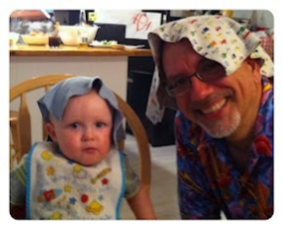
I’ve been feeling my oats in 2016 as an advocate and catalyst for Empowering people as they travel together toward best health. As my dear friend, Mary Sue said, Danny, you’ve found your calling! Wearing my many hats, I often feel like I know enough to be dangerous about much of healthcare. When I walk into a room of experts in their fields – clinicians, researchers, policy makers, techies, insurers, executives, I think, What am I doing here? I’m way over my head. It takes two minutes to understand that I’m the connector of their considerable expertise to the workflow and life flow of patients, clinicians, caregivers, and staff. I’m also the translator among their jargons. I can shift the conversation by offering a voice for some experiences of patients, caregivers, and clinicians.
I’ve refined my work this year as a connector, translator, and advisor while working as a technical expert in patient-centered research, behavioral health information technology, community health, and health payment innovation. I’ve benefited from the warm embrace of Wellesley Partners during this transition year after leaving my 40+ years as an employee and boss. I am grateful that they believed in me and helped me polish a few rough edges of inexperience. I also appreciate the counsel of many – Doug, Geri, Pat(s), Juhan, Bevin, Eve, Jarred, Keren, Jonathan, Sarah, and Lauren to name a few. You all know who you are. Thanks. I’m grateful for the many inspiring people in the patient/caregiver/clinician experience space. Thanks for all you do. You keep my embers glowing.
But with all this wisdom and energy I still feel that person-centered healthcare is crawling forward slower than a snail in molasses. It’s discouraging and crazy-making. So, I’m determined to learn what works for change agents and catalysts. This year I’m surer than ever that person-centered is more likely to improve health, change the conversation, and breach silos than clinician, setting, or diagnosis-centered. I learned that workflow and life flow needs to be easier for people and communities close to the work. Make it easier, or the rampant burnout of many on the front lines will not diminish. We need to foster self-care plus care for each other. As much as I’m an early adopter of technology, I see that it’s not about technology first. Whatever problem we’re trying to solve needs to work for, and with people in their work/life setting and then technology can help it speed up and spread. Dysfunction plus technology is just faster dysfunction. I also heard loud and clear this year that people don’t have time to learn new stuff unless it makes something else in their life remarkably easier no matter how brilliant the solution.
I’ve learned that I need to have the image of a particular person in my mind who has a problem that needs to be solved. Lately, it’s almost always a caregiver or a supervisor of frontline clinicians and staff. Caregivers because they provide most of the nation’s healthcare. Caregivers help while trying to do their day jobs and washing the dishes. Frontline supervisors because they impact the healing culture of clinicians and staff in their spheres. Clinicians and staff have their heads down, trying to get the health work done, day in and day out. Their bosses set the tone, fight for them, serve them, appreciate them. Next year my efforts need to help caregivers and supervisors continue their good work and stay healthy. That will have an outsized impact.
I’m obsessed with how people learn what works as they navigate their health journey, both what works for groups of people (research) and how individuals figure out what works for them or their team member (the experiment of one). We experiment naturally, but not often mindfully. The art is to marry what works for groups and what works for individuals. I will continue my work with communication and dissemination of learning, informed decision support, access to health data by patients and caregivers, and communication at transitions in care.
My biggest aha about effective advocacy action came when I started to say: I can commit 4 hours a week and $0 to whatever opportunity. Being specific about our ability to invest helps us be real with ourselves and seems appreciated by our collaborators. Finally, I absolutely still know that we must have some fun doing this hard work.
So where am I heading in 2017? I’ll do more of what I love – listening, thinking, writing, collaborating, coaching and playing my horn. I’d like to make more money at it. I’m worth it. My focus will be #CarePlanning and the Experiment of One. I’m 50% sure:) Thanks for all you do. See you around the block.
Let me know if you’d like me to send you the specifics of what I’ve worked on in 2016. I’m an open book.

Yes, Danny. Favorite Paragraph: “My biggest aha about effective advocacy action came when I started to say: I can commit 4 hours a week and $0 to whatever opportunity. Being specific about our ability to invest helps us be real with ourselves and seems appreciated by our collaborators. Finally, I absolutely still know that we must have some fun doing this hard work.” Thanks for all your hard work!